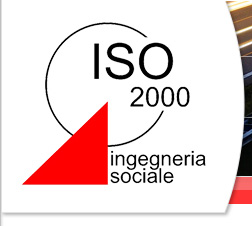
 ISO 2000 was established in 1997 by Pier Franco Treglia and Francesco Salvatore that, after a long career in a leading Italian motorway concession company, have decided to give birth to a new entrepreneurial project. Since 1999 ISO 2000 has actively operated both in the national and international fields.
ISO 2000 was established in 1997 by Pier Franco Treglia and Francesco Salvatore that, after a long career in a leading Italian motorway concession company, have decided to give birth to a new entrepreneurial project. Since 1999 ISO 2000 has actively operated both in the national and international fields.
To the two promoting Partners, during the years, two young Partners are added, Edoardo Mazzia and Francesca Treglia. Their entry projects ISO 2000 in the future.
Since 2002, as member of the Industrialists’ Union of Rome, ISO 2000 has actively worked in the field of the Transport Section.
ISO 2000 has developed feasibility studies for infrastructural and managerial operations, analyses of the safety of road infrastructures, individuation of quality systems, socio-economic evaluations in relation to investment projects of different kinds, projects and research for the operative management of infrastructures, traffic surveys, market research, statistical research, training of transport system staff, elaboration of teaching and operating manuals and training for quality.
As well as the founder-members, armed with decades of experience gained not only in the planning and management of transport systems, but also in research and training, ISO 2000 offers a highly qualified technical team and a crew of consultants of primary and confirmed professional ability guaranteeing multidisciplinary response to problems on which they are called to work.
The aim of ISO 2000 therefore is to provide a professional reference for consultancy and managerial planning for complex systems with the purpose of improving the effectiveness and efficiency of the mechanisms that characterise their interaction between components of: supply, demand and externality.
Its past experience and network of collaboration of which it avails allows ISO 2000 to act as interlocutor in a vast field of activities and among these it is worth mentioning:
- management of studies and research;
- technical-economical feasibility of interventions;
- planning of interventions;
- technical assistance for the drawing up of bid documents;
- evaluation of bid documents;
- monitoring and performance assessment for complex systems;
- definition of operating procedures for complex systems;
- training of supervision and operating staff.

